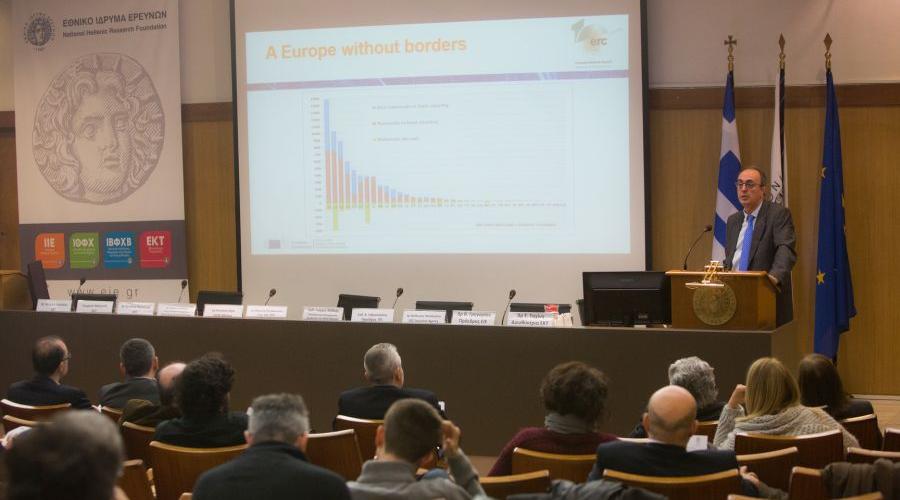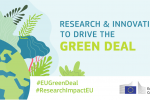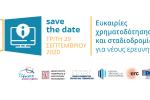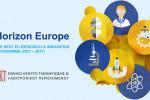
Ten years of the European Research Council (ERC) was celebrated at an event hosted by the National Documentation Centre. ERC was represented by Dr Theodore Papazoglou, (European Research Council Executive Agency – ERCEA), who explained the contribution ERC makes to strengthening excellence and referred to the upcoming calls. From its commencement to January 2017, ERC allocated a total of 12.5 billion euros for 6907 research programmes, which contributed to the furthering of the careers of researchers. In all, 44% of research projects had team members who became renowned scientists at research institutes, while in 60% of projects, team members were now employed by academic institutions. During the past 10 years, there have been 65 globally outstanding scientific ‘discoveries’, with European researchers participating in 40 of them and ERC funding 15.
Professor Nektarios Tavernarakis, President of the Institute of Technology and Research, talked about ERC research programmes, stressing two main outcomes of ERC funding during that period. Firstly, it improved the prospects of any researcher receiving it, and secondly, it facilitated successful cutting-edge research. Over its 10 year-operating period, 7,000 ‘champion researchers’ and 50,000 members of research teams were employed.
In terms of its contribution to strategy for the development of Research and Innovation in Greece, Prof. Tavernarakis presented statistics and data on ERC actions in relation to Greek researchers and the long-term weaknesses of Greece. He emphasized the importance of investment in Research and Innovation given that for every million euros of regular grants there is a return of 2-3 million euro. Actions to strengthen Research and Innovation in Greece include: ensuring consistency and continuity of research policy; establishing a robust national funding programme for research; consolidating the research area with the support of universities and research centres in knowledge transferral; linking research and innovation activities with the needs of the public and private sector; systematically attracting private sources of sponsorship and awards for research and innovation activities and providing incentives to attract Greek researchers from the international community.
Prof. Tavernarakis' presentation was followed by Professor Giorgos Kollias, President of the Board of Directors at BSRC Fleming, who covered ERC research programmes and advice on competitiveness and the strategic development of a host organisation such as BSRC Fleming. He used BSRC Fleming as an example of an organisation model for obtaining funding from programmes such as those of the ERC and successfully linking research with innovation and development. Prof. Kollias went on to explain the ways in which ERC programmes make a difference to an organisation by helping to change behaviour and focus on cutting-edge research and innovation; investing in high-quality human resources; having visibility on regional /European and global networks; investing sufficient money to support excellence; providing incentives for 'brain gain'; simplifying bureaucracy and managing programmes. As Prof. Kollias pointed out, a mark of BSRC Fleming's success is the fact that 4 Fleming researchers from a total of 14 research teams active at the centre have been given awards by the ERC.
Dr Giorgos Xourdakis, Special Scientific Advisor, Office of the Deputy Minister for Research and Innovation, described a new institutional means of support for both new and experienced researchers aimed at promoting 'Scientific Excellence'. The initial budget for the 2016-2018 period is 240million euros. Using similar methodology to that favoured by the ERC and other organisations which are active abroad, the goal is to cultivate research culture, take measures to reverse the trend of young researchers leaving the country to work abroad and to contribute to development and productive reconstruction of the Knowledge Economy. With focused and forward-looking support of young research scientists at Greek universities and research centres, a comprehensive strategy can be formulated, ensuring the public interest and bringing consistency and continuity of funding.
The event was brought to a close with Dr Antigoni Dima ( Researcher, BSRC Fleming, ERC-StG), Assistant Professor Athanasios Papathanasiou (NTUA, ERC-StG, ERC-PoC) and Assistant Professor Alexandros Kioupkiolis (Aristotelis University Thessaloniki, ERC-CoG), all successful ERC fellows, talking about the advice ERC gives regarding careers and further tips on preparing competitive proposals. Dr Marina Aggelaki (National Documentation Centre) covered Open Access in ERC, while Giorgia Mazioti and Dr Christina Pascual, from the National Documentation Centre, explained the centre's role and its services as National Contact Point for Horizon 2020.
Event videos can be found at http://www.ekt.gr/el/events/program/20686.
The National Documentation Centre is National Contact Point for Horizon 2020 and for a series of individual programmes such as ERC, supporting the participation of Greek academia and the research and business communities. It covers all stages of research projects, from proposal preparation to implementation and exploitation of research results by offering services including a helpdesk for : information and consultancy, development and management of information material, organisation of events and seminars, partner search for joint ventures and joint proposal submission.
It also records national participation and publishes statistics and performance indicators.















